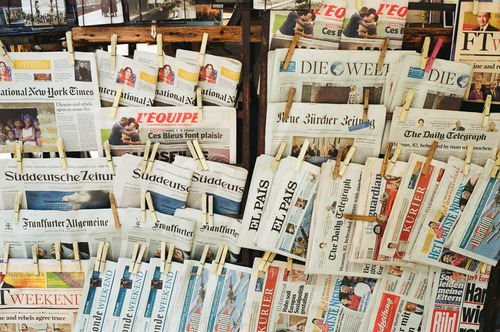
Photograph by Teju Cole
I’ve never really worried about writer’s block. I think of breaks from writing more as “installing important updates,” focusing on input rather than output. But lately I’ve been going through a period of reader’s block, a new and frustrating experience. I haven’t been in the mood to read books or even articles. This got me thinking about the reading habits of writers; I wondered how they differed from my own. So I asked thirteen questions to ten writers I admire, working in different genres, in an attempt to discover how writers read.
—Elisa Gabbert
4) Do you ever read for “guilty pleasure”?
ALICE BOLIN: I think no. I get my trash from TV.
TEJU COLE: I read what I like. No guilt ever.
DARCIE DENNIGAN: I grew up in New England and went to Catholic school most of my life, so yes, when reading feels pleasurable, as it often does, I do feel guilty. I guess I always feel guilty when I read these days because when I’m reading, I’m shirking any number of responsibilities. The laundry, the dishes, buying my daughter shoes, finishing a freelancing project, correcting papers. The only thing I don’t feel guilty about not doing when I’m reading is writing.
But I guess you mean do I ever read anything sort of easy, just to escape? Of course. Mostly that kind of reading I do online. cnn.com is the best guilty pleasure. It’s so over the top, so ostentatious yet so conservative. They always find the scariest stories that prey on all of my fears and they barely footnote how unlikely the scenarios are. I’m sorry that I add to their number of hits every day, but I do.
JORDAN ELLENBERG: I read books I think are in certain respects bad, like the “Twelve” series, which is about psychic vampires. But I don’t feel guilty about it. I think I’m reading those books for a reason.
GRAHAM FOUST: You mean like US Weekly or something? Sometimes I do, but I don’t feel all that guilty about it.
RUTH GRAHAM: Of course!
J. ROBERT LENNON: I have never in my life felt guilty for reading anything.
ADA LIMÓN: Oh yes, I love guilty pleasures. Depending on what’s going on in my life, I will read popular novels (all of Gillian Flynn’s thrilling and gruesome books) or even get on a British detective novel kick. I devoured all of Susan Hill’s Simon Serrailler detective novels and Robert Goddard’s mysteries. Oh, and yes, I read all the magical Deborah Harkness novels over a particularly hard winter when witches and vampires just made more sense than life. I don’t...
You have reached your article limit
Sign up for a digital subscription and continue reading all new issues, plus our entire archives, for just $1.50/month.
Already a subscriber? Sign in




